For Local Communities
Contributing to the Community
| Fiscal 2022 Objectives | Fiscal 2022 Achievements | Self-Evaluation | Priority Objectives for Fiscal 2023 |
|---|---|---|---|
|
|
★★ |
|
- Self-evaluation: ★★★ Achieved more than targeted / ★★ Achieved as targeted / ★ Achieved to some extent
Based on its business philosophy of “contributing to the culture, benefits, and welfare of people throughout the world,” Sharp is working to address local social issues as a member of the communities where it does business. In order to continue fostering relationships of mutual prosperity with communities, Sharp employees take the initiative in carrying out voluntary and ongoing activities centered on the environment, education, and social welfare.
Environmental Conservation Activities
In recognition of the fact that preserving ecosystems and the diversity of life that they contain contributes to a healthier and more prosperous living environment for both companies and people, Sharp carries out environmental conservation activities at its production sites and sales and service bases across Japan.
Activities aimed at protecting the interdependent balance of life on Earth, its biodiversity, specifically the biodiversity of satoyama (areas that lie between the foot of a mountain and arable land), are spearheaded by the Sharp Green Club (SGC), a volunteer organization composed of Sharp and its labor union. The SGC’s activities focus on environmental challenges that are familiar to the lives of Sharp Group employees in Japan and emphasize communication with local residents and other stakeholders to raise environmental protection awareness. An example of the SGC’s satoyama protection activities is the Sharp Forest project, which involves afforestation efforts conducted by volunteers in five locations around Japan that seeks to use forest cultivation as a means of fostering an understanding of the relationship, as well as deepening the connection, between forests, wildlife, and humanity and to foster greater global environmental mindedness. The SGC also works with the Ministry of the Environment, local governments, and other organizations in four locations in Japan to protect wetlands and waterfowl listed under the Ramsar Convention, such as by eliminating invasive species and conducting cleanup activities. In addition, employee volunteers take part in ongoing cleanup activities around the Sharp Group’s various factories and business locations as well as participate in cleanup and greening initiatives organized by local governments and other organizations, all for the sake of facilitating environmental protection tied to, and carried out in conjunction with, local communities.
In fiscal 2022, 778 such activities took place with the participation of a total 10,515 volunteers, including Sharp executives, employees, and their family members. Overseas, as well, Sharp pursues a program of corporate social responsibility (CSR) encompassing activities focused on environmental protection, educational support, and social welfare.
For Sharp, social contribution starts with what the company founder described as a “heart of gratitude.” Sharp will continue to pursue activities that are tied to the local community in order to repay the kindness that the local community, and society as a whole, has shown Sharp.
Example
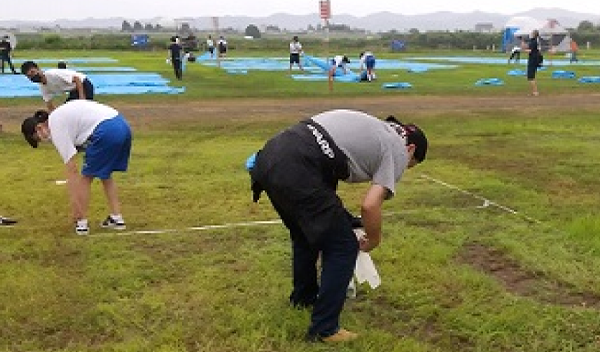
Employees from the Nagaoka Building (Nagaoka, Niigata Prefecture) cleaning up after the Nagaoka Fireworks Festival
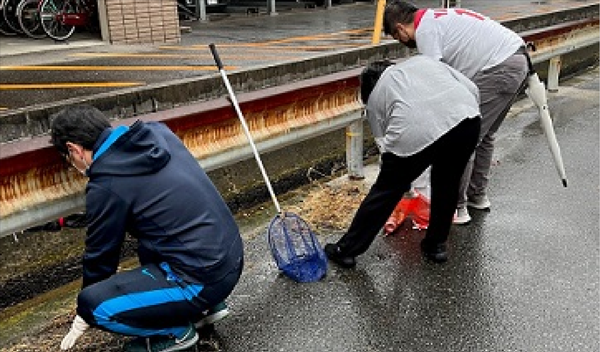
Employees from the Hiroshima Building (Asaminami Ward, Hiroshima) participating in the Yagi Waterway Cleanup
Activities in Japan
Management and employees work together on community-based volunteer activities that tackle environmental challenges.
The Makuhari Site (Chiba, Chiba Prefecture) participates in activities to beautify and preserve the area’s landscape, organized by the Makuhari New City Development Council.
In June 2022, the Urban Open Garden Project was held as a joint community effort to plant flowers in 100 planters on Kokusai-odori Avenue close to JR Kaihin-Makuhari Station. Five of our employees joined those from neighboring companies and planted marigold seedlings in 20 of the containers.
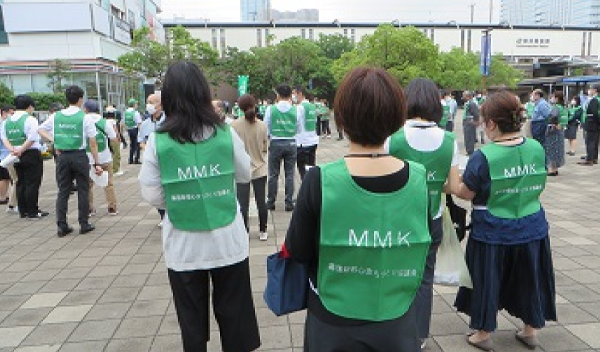
Participants listening to the briefing
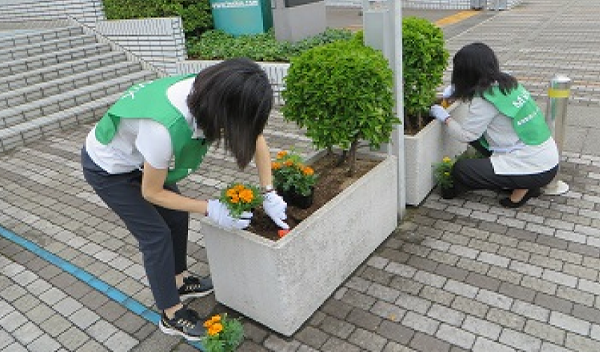
Planting marigold seedlings
At the Mie Plant (Taki District, Mie Prefecture) we engage in woodland conservation and landscape improvement around Taki’s Fureai no Mori Forest as a part of our Taki Sharp Forest initiative.
In July 2022, 26 employees and their family members pruned hydrangeas and chopped firewood. In November of the same year, they provided footpath maintenance, clearing vegetation and removing old signage.
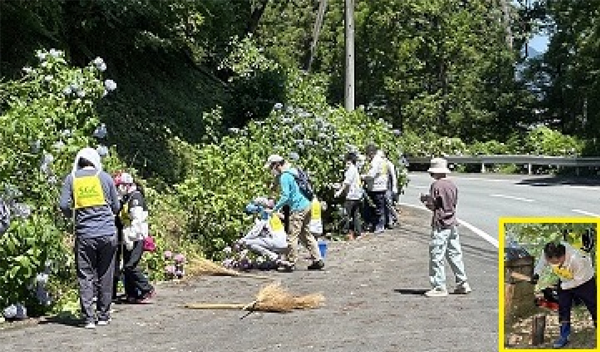
Pruning hydrangeas and chopping firewood
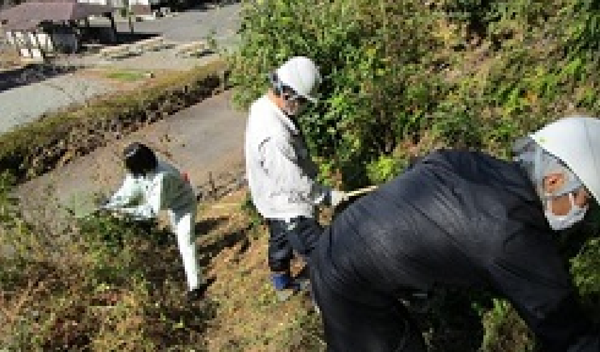
Clearing around the footpath
Every year in spring and fall, labor and management come together for community service at the Tenri Plant, (Tenri, Nara Prefecture).
In November 2022, six employees cleared trash and weeds around the Takase River, which flows close to the plant. Together with 29 participants in the Tenri Kofun Sharp Forest project held on the same day, they harvested peanuts and sweet potatoes, which were planted in May.
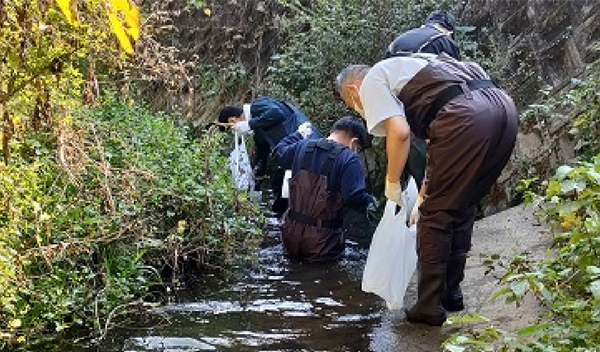
Picking up trash in the Takase River
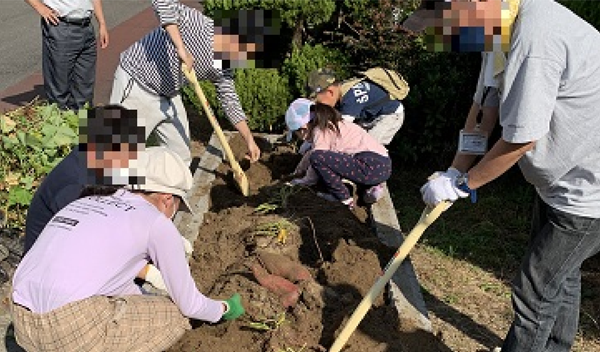
Harvesting sweet potatoes
Activities around the World
Sharp bases around the world actively carry out community service activities.
SEM: Sharp Electronics (Malaysia) Sdn. Bhd.
Malaysian R&D and sales base SEM and Yayasan Guru Malaysia Berhad signed a memorandum of understanding in May 2022 to support the introduction of programs that will allow education in digital classrooms across Malaysia.
Digital transformation in education has become an urgent topic in many schools. The programs are interactive and enable top-level online education, as well as allowing for hybrid learning between teachers and students.
We will continue to apply the latest technologies and provide smart solutions into the future.
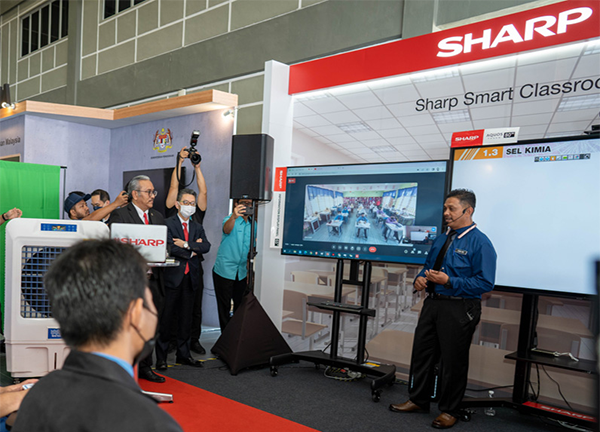
Presenting the Smart Classroom solution
SEID: P.T. Sharp Electronics Indonesia
Indonesian production and sales base SEID has resumed its environmental protection campaign, which was suspended due to the pandemic. It was conducted in August 2022 at the headwaters of the Ciliwung River, where pollution is a concern.
Participants learned how to measure the quality of river water using biological and physical analyses. All participants, including the SEID representative, also planted trees in the Telaga Saat district to protect its environment.
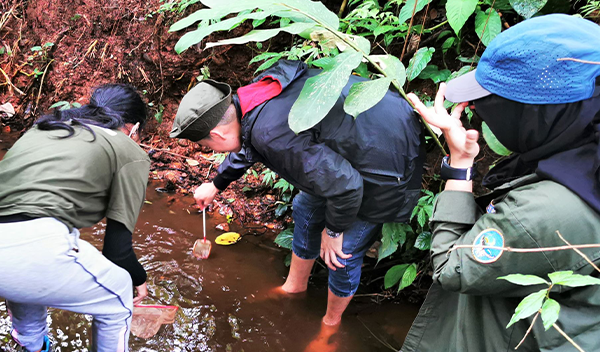
Measuring the river’s water quality
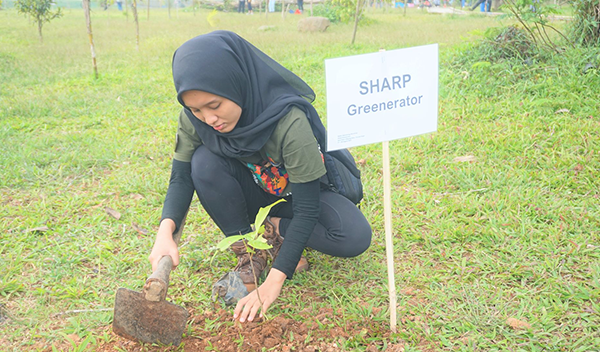
Planting a tree
SEID: P.T. Sharp Electronics Indonesia
Indonesian production and sales base SEID contributes to the educational sector through the Sharp Class Program. SEID engineers provide two months of training in theory, practice, and readiness for students at SMK (Sekolah Menengah Kejuruan; vocational college in Indonesia). Outstanding students are offered internship opportunities at SEID’s service offices and sometimes are hired as employees.
Training took place at Lampung in July 2022 and at Blitar in November 2022.
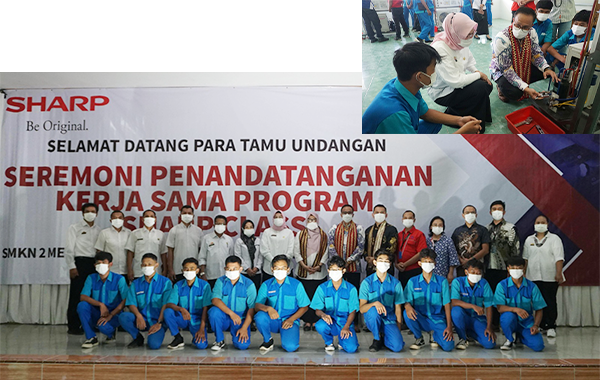
Participants at the Lampung campus
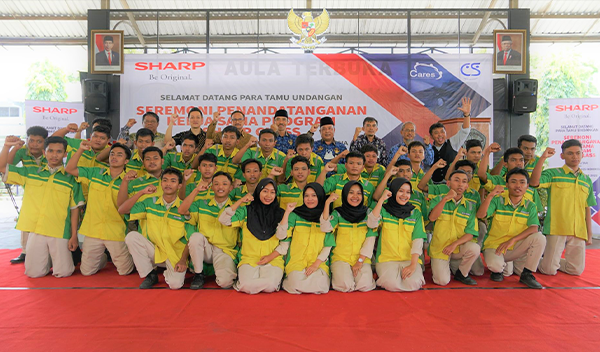
Participants at the Blitar campus
Career Education for Disabled Children
As part of a larger program of community service activities that draws on its founder’s commitment to helping disabled individuals, Sharp works with Sharp Tokusen Industry Co., a Sharp special subsidiary*, to enhance career education activities conducted at special-needs schools and similar organizations for disabled students. The following courses are provided with the aim of fostering a career-minded perspective in students and motivating them to work and achieve greater self-sufficiency.
- * A subsidiary that a company establishes and that gives special consideration in employing the disabled, in order to provide them with more employment opportunities and greater job security.
- Workplace tour: Visit the workplace of disabled employees and attend a lecture
- Workplace experience: Experience work where disabled employees are active
- School visits: Disabled Sharp employees visit schools to give talks on what it means to work
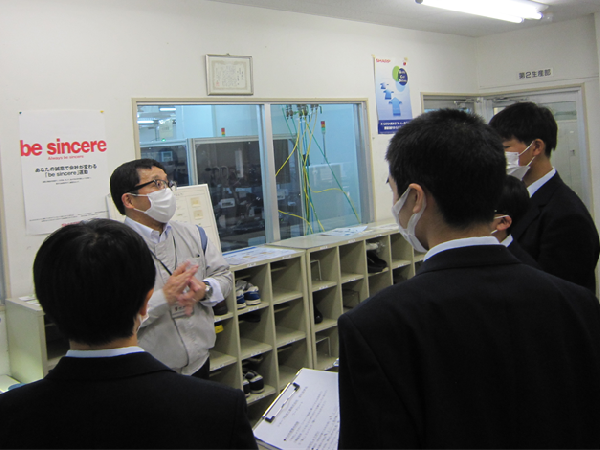
A workplace visit
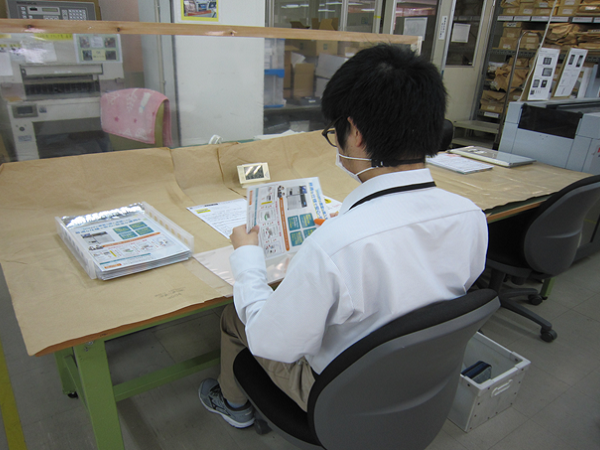
A participant in a workplace experience
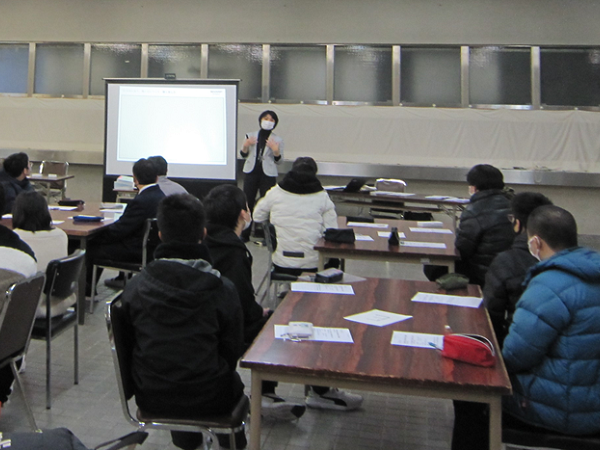
A classroom during a school visit
New Developments in the School Visit Program
The school visit program initiated in 2012 was expanded to include standard and special-needs classes in regular schools as a new endeavor in fiscal 2022.
The program initially focused on those who were hearing-impaired and conducted classes at special schools for the deaf across Japan. Subsequently, we received numerous requests, and in 2014, the program was expanded to include those with intellectual disabilities, and we began our work at special-needs schools in Osaka. We started the online school visit program as a measure against Covid-19 starting in July 2020. Although in-person school visits were limited to schools for the deaf around the country and special-needs schools within Osaka, the online program made it possible to reach out to special-needs schools nationwide.
The school visit program was initially developed to promote employment for those with disabilities. In response to a request from a teacher, we held a class at a regular school for the first time, themed on inclusive societies where everyone could live in harmony. The teachers there wanted to have students think about how they could work together to create an inclusive society. With a total of around 130 regular and special-needs students from four classes, we were able to use the concept of an inclusive society to find ways in which we could help to create a better work environment for people with disabilities.
Carrying on our founder’s passion to give support to people with disabilities, the school visit program seeks to help their search for employment. The program has evolved and expanded its reach in response to people’s requests and their environment. This time, it was a fortunate encounter that resulted in our new course of action.
We will continue with the initiative in collaboration with our partner institutions so that it may become a useful contributing factor for the creation of inclusive societies. At the same time, we will be listening to the community and developing programs that benefit society, as well as continuing to provide career training for special-needs schools.
Comment from a Principal of a Special-needs School Participating in Career Education
Sharp Tokusen Industry Co. is a steadfast supporter of our school with regard to student career paths, and for this I am deeply grateful. For roughly three years and four months every part of our lives has been significantly impacted by the pandemic, with schools, as well, trying to figure out ways to operate amidst a variety of restrictions. During all of this, Sharp Tokusen’s online career education school visits and other initiatives were appreciated by our students as opportunities for them to think independently about the value and joy of work.
Naniwa Special-needs Senior High School opened in April 2015 as the fifth special-needs high school in Osaka Prefecture to provide vocational education. Since then, our goal has been to help students with intellectual disabilities participate in society and achieve independent and fulfilling lives through employment after graduation.
Students work toward this goal with a heartfelt commitment to keep trying, keep persevering, and keep believing as they pursue on-campus practical and classroom vocational education along with a variety of hands-on training outside the school. The powerful encouragement the students receive through Sharp Tokusen’s workplace experience and school visit programs is of irreplaceable value. I eagerly look forward to the further instruction and support that Sharp Tokusen can provide.
All of the faculty and staff at our school are united in a continuing commitment to educational activities, undertaken in conjunction with various relevant organizations, that will heighten each and every student’s desire to find employment, as well as help them to achieve it. I sincerely appreciate the wonderful opportunities with which Sharp Tokusen provides us, and I wish Sharp Tokusen all the best for its continued development and success.
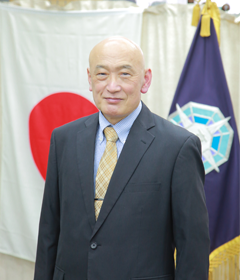
Kyoichi Narasaki
Principal, Osaka Prefectural Naniwa Special-needs Senior High School
Message from a School Visit Employee Instructor
This is now my seventh year as a school visit instructor since starting in fiscal 2016. I was extremely nervous during my first class, but the attentiveness of both the students and teachers put me at ease and everything went well. Now, after so much experience, I am perfectly comfortable getting up and speaking in front of everyone. During the class group work, the students are always so diligent in exchanging opinions and in how they work that it makes me motivated to work hard as well.
I hope all of the students will think about their futures without rushing and will cultivate a lot of great memories of their school days.
I also hope that they are fastidious about writing down what their teachers have taught them, and that they will regularly go back and reflect on them. These school visits have also helped me to grow, and they encourage me to keep tackling new challenges in my own work.
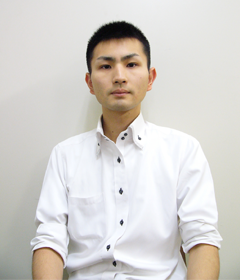
Yasunori Kishi
Sharp Tokusen Industry Co.